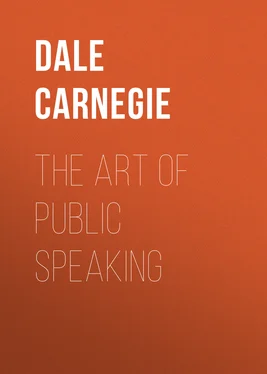How to Conquer Monotony
We obviate monotony in dress by replenishing our wardrobes. We avoid monotony in speech by multiplying our powers of speech. We multiply our powers of speech by increasing our tools.
The carpenter has special implements with which to construct the several parts of a building. The organist has certain keys and stops which he manipulates to produce his harmonies and effects. In like manner the speaker has certain instruments and tools at his command by which he builds his argument, plays on the feelings, and guides the beliefs of his audience. To give you a conception of these instruments, and practical help in learning to use them, are the purposes of the immediately following chapters.
Why did not the Children of Israel whirl through the desert in limousines, and why did not Noah have moving-picture entertainments and talking machines on the Ark? The laws that enable us to operate an automobile, produce moving-pictures, or music on the Victrola, would have worked just as well then as they do today. It was ignorance of law that for ages deprived humanity of our modern conveniences. Many speakers still use ox-cart methods in their speech instead of employing automobile or overland-express methods. They are ignorant of laws that make for efficiency in speaking. Just to the extent that you regard and use the laws that we are about to examine and learn how to use will you have efficiency and force in your speaking; and just to the extent that you disregard them will your speaking be feeble and ineffective. We cannot impress too thoroughly upon you the necessity for a real working mastery of these principles. They are the very foundations of successful speaking. "Get your principles right," said Napoleon, "and the rest is a matter of detail."
It is useless to shoe a dead horse, and all the sound principles in Christendom will never make a live speech out of a dead one. So let it be understood that public speaking is not a matter of mastering a few dead rules; the most important law of public speech is the necessity for truth, force, feeling, and life. Forget all else, but not this.
When you have mastered the mechanics of speech outlined in the next few chapters you will no longer be troubled with monotony. The complete knowledge of these principles and the ability to apply them will give you great variety in your powers of expression. But they cannot be mastered and applied by thinking or reading about them—you must practise, practise , PRACTISE . If no one else will listen to you, listen to yourself—you must always be your own best critic, and the severest one of all.
The technical principles that we lay down in the following chapters are not arbitrary creations of our own. They are all founded on the practices that good speakers and actors adopt—either naturally and unconsciously or under instruction—in getting their effects.
It is useless to warn the student that he must be natural. To be natural may be to be monotonous. The little strawberry up in the arctics with a few tiny seeds and an acid tang is a natural berry, but it is not to be compared with the improved variety that we enjoy here. The dwarfed oak on the rocky hillside is natural, but a poor thing compared with the beautiful tree found in the rich, moist bottom lands. Be natural—but improve your natural gifts until you have approached the ideal, for we must strive after idealized nature, in fruit, tree, and speech.
1. What are the causes of monotony?
2. Cite some instances in nature.
3. Cite instances in man's daily life.
4. Describe some of the effects of monotony in both cases.
5. Read aloud some speech without paying particular attention to its meaning or force.
6. Now repeat it after you have thoroughly assimilated its matter and spirit. What difference do you notice in its rendition?
7. Why is monotony one of the worst as well as one of the most common faults of speakers?
CHAPTER III
EFFICIENCY THROUGH EMPHASIS AND SUBORDINATION
Table of Contents
In a word, the principle of emphasis ... is followed best, not by remembering particular rules, but by being full of a particular feeling.—C.S. Baldwin, Writing and Speaking .
The gun that scatters too much does not bag the birds. The same principle applies to speech. The speaker that fires his force and emphasis at random into a sentence will not get results. Not every word is of special importance—therefore only certain words demand emphasis.
You say Massa CHU setts and Minne AP olis, you do not emphasize each syllable alike, but hit the accented syllable with force and hurry over the unimportant ones. Now why do you not apply this principle in speaking a sentence? To some extent you do, in ordinary speech; but do you in public discourse? It is there that monotony caused by lack of emphasis is so painfully apparent.
So far as emphasis is concerned, you may consider the average sentence as just one big word, with the important word as the accented syllable. Note the following:
"Destiny is not a matter of chance. It is a matter of choice."
You might as well say MASS-A-CHU-SETTS , emphasizing every syllable equally, as to lay equal stress on each word in the foregoing sentences.
Speak it aloud and see. Of course you will want to emphasize destiny , for it is the principal idea in your declaration, and you will put some emphasis on not , else your hearers may think you are affirming that destiny is a matter of chance. By all means you must emphasize chance , for it is one of the two big ideas in the statement.
Another reason why chance takes emphasis is that it is contrasted with choice in the next sentence. Obviously, the author has contrasted these ideas purposely, so that they might be more emphatic, and here we see that contrast is one of the very first devices to gain emphasis.
As a public speaker you can assist this emphasis of contrast with your voice. If you say, "My horse is not black ," what color immediately comes into mind? White, naturally, for that is the opposite of black. If you wish to bring out the thought that destiny is a matter of choice, you can do so more effectively by first saying that " DESTINY is NOT a matter of CHANCE ." Is not the color of the horse impressed upon us more emphatically when you say, "My horse is NOT BLACK . He is WHITE " than it would be by hearing you assert merely that your horse is white?
In the second sentence of the statement there is only one important word— choice . It is the one word that positively defines the quality of the subject being discussed, and the author of those lines desired to bring it out emphatically, as he has shown by contrasting it with another idea. These lines, then, would read like this:
" DESTINY is NOT a matter of CHANCE . It is a matter of CHOICE ." Now read this over, striking the words in capitals with a great deal of force.
In almost every sentence there are a few MOUNTAIN PEAK WORDS that represent the big, important ideas. When you pick up the evening paper you can tell at a glance which are the important news articles. Thanks to the editor, he does not tell about a "hold up" in Hong Kong in the same sized type as he uses to report the death of five firemen in your home city. Size of type is his device to show emphasis in bold relief. He brings out sometimes even in red headlines the striking news of the day.
It would be a boon to speech-making if speakers would conserve the attention of their audiences in the same way and emphasize only the words representing the important ideas. The average speaker will deliver the foregoing line on destiny with about the same amount of emphasis on each word. Instead of saying, "It is a matter of CHOICE ," he will deliver it, "It is a matter of choice," or " IT IS A MATTER OF CHOICE "—both equally bad.
Читать дальше












